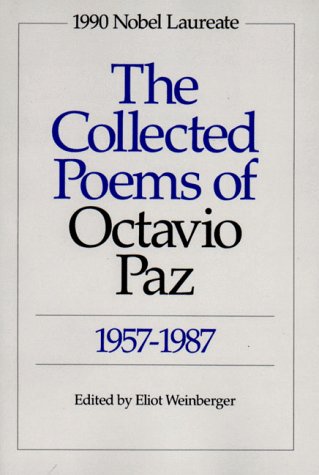 tr Weinberger, w/Bishop, Blackburn, Levertov et al
tr Weinberger, w/Bishop, Blackburn, Levertov et al Customer Review: Collected Poems of Octavio Paz
This is an excellent edition of the collected poems of Octavio Paz, with English translations facing the Spanish originals. I purchased this as a gift for my Spanish teacher and she was delighted! My favorites are his poems written when he served as a Mexican diplomat in India and Japan. His sensitive mind absorbed the nuances of place and religion, which are recreated for us in the poems. His efforts at haiku en espagnol are enlightening, pun intended.
Customer Review: excellent poetry
I bought this book after reading an excerpt of one of Paz's poems at a camp. I didn't know what poem it was from, so I bought the book and scoured it until I found the poem. It was Brotherhood. The poetry is beautiful and moving. It is the type of poetry you can read and enjoy no matter if you understand what it is saying, the writing is that beautiful
Blasting out lightning fast scales on the classical guitar is a very impressive feat. It sounds so good and really raises the emotional level of your playing. You really can increase your playing speed if you understand a few basic principles.
The first principle of speed on the classical guitar is the fact that whole pieces are not fast. Speed in compositions comes in bursts. This is the basic tenet of comparison. A piece played Largo might have Andante passages that are fast. But these Andante passages are slow if compared to a composition that is presto. So be aware that speed is not necessarily how many notes a second but more a factor of notes and phrases in comparison to each other.
Practice, Practice, Practice
You already know that practice is critical to speed. You have to practice your scales just for the practice, and you have to practice a wide variety of scales. Classical Guitar is like every other form of kinesthetic art; as you practice the motions you make will settle into deeper regions of your brain and your body will learn how to do it without you even thinking about it. With practice you will be able to blast out very fast scales that will amaze you.
Now, all of that sounds good but what about some practical advice on how to get faster?
This part is easy, and the single best thing you can do to improve your speed is to make a conscious attempt at finger crossing patterns with your right hand. This is usually the biggest challenge to playing speed. Practice, on a daily basis if possible, crossing string patterns.
What are string crossing patterns?
This is the way you pick across the six strings with your right hand. If you are playing a scale and you transition from string to string with the right hand you will use a pattern such as playing the first string with your index finger then playing the second string with your middle finger. On to the third string you are back to your index finger and for the fourth string again back to the middle finger.
Avoid the same crossing patterns and create new ones
As you become aware of your finger crossing you will see that you have very distinct patterns that you use. You should create and practice new patterns that are not comfortable for you. This truly will dramatically increase your speed. A good example of a new pattern you might try is to switch your starting finger. When practicing scales you probably start the first note with your right hand index finger. And as you progress through the scale you cross scales in the same pattern. You should try starting the scale with your middle finger. This will totally change the crossing pattern you use for playing the scale and once you get a bit of practice like this your speed will increase significantly. Vary this crossing pattern in as many ways as you can and make sure you also do double strikes where you cross using the same finger. Try playing using only two fingers and then try using only three fingers. These new approaches will create new crossing patterns for you.
To improve your playing speed on the classical guitar you have to practice and you have to bump yourself out of your normal routines of playing. But with some conscious effort you can significantly improve your speed.
The author has been playing the classical guitar for over 20 years and is still learning. For more interesting stuff about this beautiful instrument including mp3s of him playing:
latin music lyrics
No comments:
Post a Comment